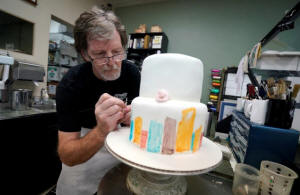|
Supreme Court weighs baker's refusal to
make cake for gay couple
 Send a link to a friend
Send a link to a friend
 [December 05, 2017]
By Lawrence Hurley [December 05, 2017]
By Lawrence Hurley
WASHINGTON (Reuters) - The U.S. Supreme
Court on Tuesday is set to hear arguments in a major case on whether
certain businesses can refuse service to gay couples if they oppose
same-sex marriage on religious grounds in a dispute involving a
conservative Christian baker in Colorado who declined to make a wedding
cake for two men.
The nine justices at 10 a.m. are due to hear an appeal brought by Jack
Phillips, a baker who runs Masterpiece Cakeshop in the Denver suburb of
Lakewood, of a state court ruling that his refusal violated a Colorado
anti-discrimination law.
In one of the biggest cases of the conservative-majority court's
nine-month term, the justices must decide whether the baker's action was
constitutionally protected, meaning he can avoid punishment under the
Colorado law.

Phillips contends that law violated his rights to freedom of speech and
free exercise of religion under the U.S. Constitution's First Amendment.
The Supreme Court arguments will focus on his free speech claim, based
on the idea that creating a custom cake is a form of free expression.
The couple, David Mullins and Charlie Craig, call the baker's refusal a
simple case of unlawful discrimination based on sexual orientation.
The Supreme Court legalized gay marriage in a landmark 2015 ruling
written by Justice Anthony Kennedy, one of the court's five
conservatives. The 81-year-old Kennedy, who has joined the court's four
liberals in major decisions on issues such as abortion and gay rights,
could cast the deciding vote. Kennedy also is a strong proponent of free
speech rights. [L2N1LU1W9]
The case highlights tensions between gay rights proponents and
conservative Christians who oppose same-sex marriage.
A ruling favoring Phillips could open the door for businesses that offer
creative services to spurn gay couples by invoking religious beliefs, as
some wedding photographers, florists and others already have done.
Conservatives have filed other lawsuits also seeking to limit the reach
of the 2015 gay marriage ruling.
The legal fight broke out in 2012 when Phillips told Mullins and Craig
that due to his Christian beliefs he would not be able to make a cake to
celebrate their wedding.
[to top of second column] |

Baker Jack Phillips decorates a cake in his Masterpiece Cakeshop in
Lakewood, Colorado U.S. on September 21, 2017. REUTERS/Rick
Wilking/File Photo

The two men married in Massachusetts but wanted to celebrate their
nuptials with friends in Colorado. At the time, Colorado allowed
civil unions but not marriage between same-sex couples.
The couple turned to the American Civil Liberties Union, which filed
a complaint on their behalf, saying Phillips had violated Colorado
state law barring businesses from refusing service based on race,
sex, marital status or sexual orientation.
The Colorado Civil Rights Commission found that Phillips had
violated the law and ordered him to take remedial measures including
staff training and the filing of quarterly compliance reports. In
August 2015, the Colorado Court of Appeals also ruled against
Phillips.
The Colorado Supreme Court refused to hear the case, prompting
Phillips to appeals to the U.S. Supreme Court.
The ACLU said Phillips' legal team at the conservative Christian
group Alliance Defending Freedom is advocating for a "license to
discriminate" that could have broad repercussions beyond gay rights.
"I can't emphasize enough how far sweeping the argument is both in
terms of what it is saying about the Constitution and who will be
affected," ACLU lawyer Louise Melling said.
Phillips' lawyers said creative professionals should not be forced
to engage in expression that goes against their conscience.
"If the court were to say it could force someone like Jack ... to be
coerced, then it has the power to force anyone of us to speak those
same messages and to violate our convictions," Phillips' attorney
Kristen Waggoner said.

(Reporting by Lawrence Hurley; Editing by Will Dunham)
[© 2017 Thomson Reuters. All rights
reserved.]
Copyright 2017 Reuters. All rights reserved. This material may not be published,
broadcast, rewritten or redistributed. |